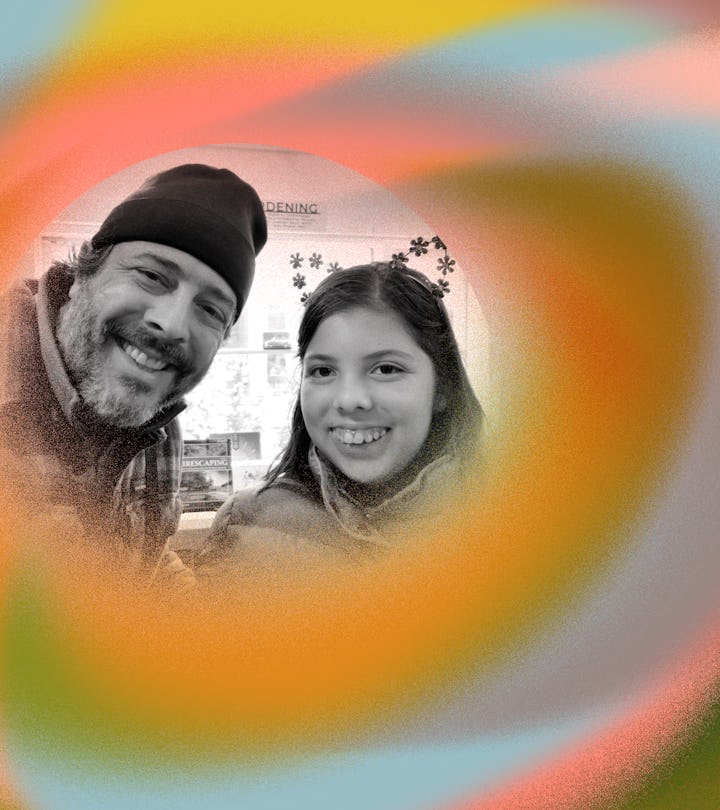
“Yes, Autism Is A Disability. And Being Disabled Is Not Bad.”
(A father-daughter conversation for the parenting website, Romper.com, between my son Matt Villano, a writer/journalist, and my oldest granddaughter, Sage Villano, an Autistic teenager.)
by MATT VILLANO and SAGE VILLANO
April is Autism Acceptance Month around the country, but every month is Autism Acceptance Month in my house. I’ve got three daughters — ages 13, 11, and 7 — and the oldest, an eighth grader named Sage, is autistic. Sage was diagnosed with autism in April 2021. Two years before that, doctors had misdiagnosed her. In all, our family searched nearly five years for a diagnosis. Something I’ve learned since then: Doctors have trouble diagnosing girls with autism. This means those recent numbers from the United States Centers for Disease Control suggesting that 1 in 36 kids are autistic probably underestimate the truth.
Sage and I talk about her autism a lot. We also talk a lot about autism in general. One of the recurring themes: How there aren’t enough autistic voices in the conversation about autism. Sage, like most autistic individuals, thinks allistic people — that is, people who don’t have autism — control the narrative. The more I read, the more I know she’s right.
When I floated the idea of sharing one of our father-daughter conversations about what it’s like to be a kid with autism with the wider world, Sage couldn’t agree fast enough. We decided on a Q&A. We did our “interview”on a Friday afternoon in my living room. She sat on her preferred side of our L-shaped couch, petting her cat, Bluebell; I sat on the other side. An app on my phone recorded everything. We focused mostly on what she wishes everyone understood about autism. Over the course of 20 minutes, my brilliant daughter taught me a ton. Below is our talk. —Matt Villano
Dad: To what extent do you consider autism a disability?
Sage: It is a disability. And being disabled is not bad. It’s just a word that people have made into this taboo word because disabled people are known to be different. Saying “disabled” is a bad word is like saying “gay” is a bad word.
[My kid, who is a lesbian, shakes her head in disgust at the notion of thinking the word “gay” could be bad.]
Dad: When in your life do you feel most misunderstood?
Sage: In schools they’ll have that talk in class about clear communication and body language, and how you’re being rude and disrespectful if you don’t make eye contact. Oh, they also don’t like it when you fidget with your hands. And I think that that way of thinking, this whole notion of having “manners,” really is not set up for autistic people. As an autistic person, I don’t make eye contact. I stare at people’s foreheads. I fidget with my hands all the time. I crack my knuckles as a stim [or, a way to manage feeling overstimulated].
[Sage takes a beat to crack her knuckles.]
When people see me doing that, they think I’m not trying. Sometimes even you do that.
[Not gonna lie, I feel pretty terrible when she says this but I let it go.]
But I am trying. I’m always trying. I’m physically incapable of acting like everyone else, of “manners.” It’s part of my disability.
When you’re a teenager, people will pick on every little thing they think you do wrong and then they will point it out to you. When you’re autistic, there’s even more stuff that society considers wrong.
Dad: What aspects of autism present the biggest challenge for you?
Sage: I struggle with reading social situations and understanding social cues, and with knowing what to say and what not to say in the moment. Sensory issues are a big part of it too. A big part of my autistic experience is the noises of certain things, and the feeling of certain textures and certain items of clothing. Also getting overheated is really uncomfortable for me.
[She stops to eat a handful of Pepperidge Farm cheddar goldfish crackers, a snack she calls her “same food” because she must have it every day. She has explained previously that she likes the crunch and the way they feel in her mouth.]
Dad, you know that’s why I hate being outside in summer so much.
Dad: Oh, I know. Aside from sweating in summer, what’s the hardest thing about being an autistic teenager?
Sage: [Laughs.] The social scene. Teenagers are ruthless, bro! They’re mean. There’s always going to be people that bully you for being different or wearing ugly, too-basic clothes, even though you might be wearing them for sensory comfort. People will always make fun of you for not knowing when to stop talking or interrupting too much or not getting the memo or whatever. Not “reading the room.” When you’re a teenager, people will pick on every little thing they think you do wrong and then they will point it out to you. When you’re autistic, there’s even more stuff that society considers wrong.
[Hearing this makes me wince; she’s been bullied for her autism multiple times. The most recent incident happened at the start of this month. I decide to move on and not dwell on the bullying right now.]
Dad: You’ve had some autistic dysregulations over the course of your life. What is that experience like for you?
Sage: It depends. Sometimes I’m so overstimulated or tired from masking, I just shut down. Other times I get really riled up and I feel like I don’t have control. The connection between my body and my brain just goes off. In both moments I can’t even think about what I’m doing. I don’t even remember half the time. People will tell me, “You threatened to throw yourself down the stairs,” or, “You punched me in the face.” And I’ll be like, “Really?” They’ll be like, “Yeah, why don’t you remember?” And I’m like, “Because the connection to my brain and my body just shut down, bro.” It’s scary. And it’s harder when allistic people don’t understand or make me feel bad about it.
[She stops and thinks for a second.]
I guess I understand why people wouldn’t understand, but it still makes me feel bad.
Dad: OK, you know I’m a grammar nerd, so I want to ask you a few questions about semantics. People sometimes describe autistic individuals or people they suspect might be autistic individuals to be “spectrumy” or “on the spectrum.” What do you think of these terms?
Sage: Spectrumy?
Dad: Yes, have you never heard that phrase?
Sage: Dude, that’s just wrong. I’ve never heard that, and I don’t ever want to hear it again.
Autism isn’t some kind of disease that needs to be cured. It’s a part of us and we shouldn’t have to change it just to fit society’s standards.
Dad: It is pretty gross. What about “on the spectrum,” Sage?
Sage: The spectrum is designed around who’s the closest to looking allistic, which implies that autism is a bad thing when it isn’t. What I mean is that the two ends of the spectrum are “low-functioning” and “high-functioning,” which is problematic because it makes us think that, as autistic people, we’re not valid unless we “function” the way allistic people think we should. When I hear someone say that phrase, I feel disrespected.
Dad: So, what is a better phrase to use?
Sage: Honestly, just say “autistic.” People are either autistic or they’re not.
Dad: If you could tell people one thing about being autistic, what would it be?
Sage: Autistic people are humans. Autism isn’t some kind of disease that needs to be cured. It’s a part of us and we shouldn’t have to change it just to fit society’s standards. There’s no cure for autism, and there shouldn’t be, because being autistic isn’t something that should be looked down upon or made fun of or used in an insulting way. Yeah, there are struggles to it — there are some benefits to it, like how we see the world — but telling us we need to find a cure, or we need to get it fixed is not true.
[Sage is starting to become visibly agitated]
Can we be done now, Dad? I want to get back to watching TV.
Dad: Yes! I promise. One last question.
Sage: [Annoyed] What?
Dad: As an autistic individual, what do you seek from people you encounter in the world?
Sage: [Stares into the distance, then chuckles to herself.] I just seek acceptance and the space to feel what I want to feel and act how I act without judgment or blame. I think everybody wants that, you know? It shouldn’t be that hard. For anyone.


